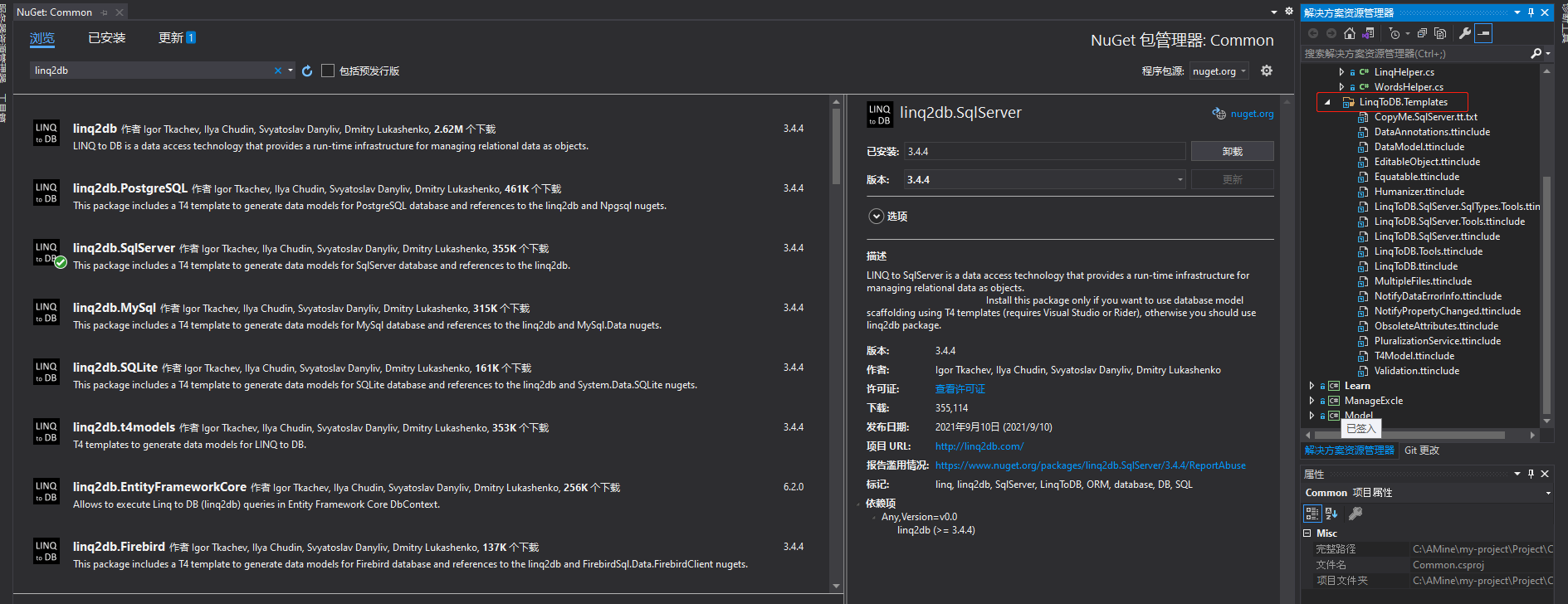ORM之linq2db
前言:今天来学习下ORM框架中的linq2db,本文将从linq2db的介绍、linq2db的优点、linq2db的简单使用做个学习记录
linq2db的介绍
LINQ to DB是最快的LINQ数据库访问库,在POCO对象和数据库之间提供简单,轻便,快速且类型安全的层。
linq2db的优点
- 简单、轻便、快捷、能快速实现CRUD
- 集成了linq语法和lambada表达式的写法
- 使用T4模板自动生成实体类,不用使用其他代码生成器了。方便
- 类型安全
linq2db的使用
项目依赖项中使用NuGet程序包添加:linq2db.SqlServer

可以看到有很多linq2db.XXX的,可能不同数据库需要引入的不同,我们这里用SQLServer,后续用到其他数据库的时候再补充
引入之后,项目中会多一个文件夹 如下:
我们从文件夹下面找到第一个文件CopyMe.SqlServer.tt.txt 看看文件夹里面的内容如下:
<#@ template language="C#" debug="True" hostSpecific="True" #> <#@ output extension=".generated.cs" #> <#@ include file="$(LinqToDBT4SqlServerTemplatesPath)LinqToDB.SqlServer.Tools.ttinclude" once="true" #> <#@ include file="$(LinqToDBT4SqlServerTemplatesPath)PluralizationService.ttinclude" once="true" #> <# /* 1. Create new *.tt file (e.g. MyDatabase.tt) in a folder where you would like to generate your data model and copy content from this file to it. 在要生成数据模型的文件夹中创建新的*.tt文件(例如MyDatabase.tt)并将此文件中的内容复制到其中 For example: MyProject DataModels MyDatabase.tt 2. Modify the connection settings below to connect to your database. 修改下面的连接设置以连接到数据库。 3. Add connection string to the web/app.config file: 将连接字符串添加到web/app.config文件: <connectionStrings> <add name="MyDatabase" providerName="System.Data.SqlClient" connectionString="Data Source=.;Database=MyDatabase;User Id=User;Password=TestPassword;" /> </connectionStrings> 4. To access your database use the following code: using (var db = new MyDatabaseDB()) { var q = from c in db.Customers select c; foreach (var c in q) Console.WriteLine(c.ContactName); } 5. See more at https://linq2db.github.io/articles/T4.html If you need to use the Microsoft.SqlServer.Types namespace, install the Microsoft.SqlServer.Types nuget, and replace the following include at the top of this file: "$(ProjectDir)LinqToDB.Templates\LinqToDB.SqlServer.Tools.ttinclude" with "$(ProjectDir)LinqToDB.Templates\LinqToDB.SqlServer.SqlTypes.Tools.ttinclude" IMPORTANT: if running .tt file gives you error like this: "error : Failed to resolve include text for file: C:\...\$(LinqToDBT4<DB>TemplatesPath)LinqToDB.<DB>.Tools.ttinclude" check tt file properties. Custom tool must be set to TextTemplatingFileGenerator, not TextTemplatingFilePreprocessor or any other value. */ NamespaceName = "DataModels"; // to configure GetSchemaOptions properties, add them here, before load metadata call LoadSqlServerMetadata("MyServer", "MyDatabase", "User", "Password"); // LoadSqlServerMetadata(".", "MyDatabase"); // Integrated Security // LoadSqlServerMetadata(string connectionString); // to adjust loaded database model before generation, add your code here, after load metadata, but before GenerateModel() call GenerateModel(); #>
步骤如下:
- 在要生成数据模型的文件夹中创建新的*.tt文件(例如MyDatabase.tt)并将此文件中的内容复制到其中
-
修改下面的连接设置以连接到数据库
-
将连接字符串添加到web/app.config文件
- 是具体使用方法
- 更多用法参考网址:https://linq2db.github.io/articles/T4.html
参照步骤 创建了一个文件夹来存放生成的实体类 如下:

将文件后缀改为*.tt时会提示:

点击确定,生成的实体类文件如下:

然后点开文件就是连接的数据库的实体类文件 ,Amazing!!!
然后CopyMe.SqlServer.tt.txt 备注的第三点是用法 ,来看下使用方法
linq2db的RRUD:
- C-Create 创建/新增:
using (var db = new PandaPTPAPDB()) { //1:新增 db.Insert(new Task()); //2:批量新增 db.Insert(new List<Task>()); }
- R-Retrieve 检索/查询:
using (var db = new PandaPTPAPDB()) { //1:查询所有 var list = (from c in db.Tasks select c).ToList(); //2:分页查询: int pageIndex = 1, pageSize = 10; var pageList = (from c in db.Tasks select c).Skip((pageIndex - 1) * pageSize + 1).Take(pageSize).ToList(); //3:查询单条 var model = (from c in db.Tasks select c).FirstOrDefault(x=>x.Id.ToString()=="12345"); }
可以看到访问数据库都是通过linq语句来进行的,linq语句的用就很多了,后续完善
- U-Update 更新:
using (var db = new PandaPTPAPDB()) { //1:更新 db.Update(new Task()); //2:批量更新 db.Update(new List<Task>()); }
- D-Delete 删除:
using (var db = new PandaPTPAPDB()) { //1:删除 db.Delete(new Task()); //2:批量删除 db.Delete(new List<Task>()); }
以上就是linq2db的最最最最基本的用法,总的来说,使用起来挺便捷的,不用自己创建实体类,访问都是基于linq表达式,还是相当方便的。
不积跬步,无以至千里;不积小流,无以成江海。ヾ(◍°∇°◍)ノ゙






【推荐】国内首个AI IDE,深度理解中文开发场景,立即下载体验Trae
【推荐】编程新体验,更懂你的AI,立即体验豆包MarsCode编程助手
【推荐】抖音旗下AI助手豆包,你的智能百科全书,全免费不限次数
【推荐】轻量又高性能的 SSH 工具 IShell:AI 加持,快人一步
· AI与.NET技术实操系列:基于图像分类模型对图像进行分类
· go语言实现终端里的倒计时
· 如何编写易于单元测试的代码
· 10年+ .NET Coder 心语,封装的思维:从隐藏、稳定开始理解其本质意义
· .NET Core 中如何实现缓存的预热?
· 分享一个免费、快速、无限量使用的满血 DeepSeek R1 模型,支持深度思考和联网搜索!
· 基于 Docker 搭建 FRP 内网穿透开源项目(很简单哒)
· ollama系列01:轻松3步本地部署deepseek,普通电脑可用
· 25岁的心里话
· 按钮权限的设计及实现